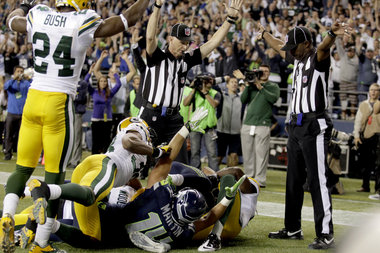Recently two local writers weighed in on the Terrelle Pryor controversy and how it reflects on college football and the recruitment of elite athletes. Take a look and see who you feel offered a more credible and carefully-written opinion.
Terrelle Pryor as a high school senior, a man among boys who led his teams to state championships in two sports, becoming the most sought-after player in the 2008 recruiting class. (ncaagridiorngab.com)
The Articulate Young Fan:
This is about more than football. Jim Tressel ran an Ohio State program that was negligent and unsupportive. He failed to provide his players with the necessary tools to succeed off the field, and it ultimately led to his downfall. I’m not here to say that Oregon would have been better off with Terrelle Pryor. But Terrelle Pryor definitely would have been better off with Oregon.
Terrelle Pryor has lived by a different set of rules his whole life. He has been a freak athlete since birth; a two-sport star at Jeanette HS in Pennsylvania, he led his teams to state championships in both football and basketball. He has been given the star treatment since he was a kid; can anyone really say the best thing for him in college is more of the same? According to Buckeye alum and ESPN college football analyst Chris Spielman, Pryor received preferential treatment from the Ohio State program; showing up late to practices or meetings, and missing workouts were not uncommon occurrences. In Chip Kelly’s program, you are not anointed; you must earn your place as a team leader. While it may seem counterintuitive to hand one player the starting job, and another player a captaincy, Coach Kelly knew that Darron Thomas hadn’t yet grown into his role as team leader, while Nate Costa garnered the respect of his teammates through his demeanor and work ethic. There aren’t stars on a Chip Kelly team; there are just young men, working together to achieve a unified goal. Could Pryor buy into that? He’d have to if he wanted to succeed in Eugene. And if he had, it would’ve had a positive effect on who he is, both as an athlete and as a man.
(Excerpted from “Tako Tuesdays, A Lesson Not Learned,” Addicted to Quack)
The Cranky, Cynical Old Man:
All over Oregon, Duck boosters and fans are breathing a sigh of relief that they didn’t get Pryor. As if, somehow, he’s the only kid out there who could get their school into trouble for stuff like this.
I have news for you, college football fans wherever you may be — this stuff is happening all over the place. You think somehow Pryor is the only player who has sold his wristband or an autographed, game-used jersey or helmet or football to someone?
Really?
And I would also caution that players of Pryor’s ilk, guys who have been wined and dined for years and believe themselves worthy of televised national news conferences when they finally determine which college to attend, very frequently come with an extreme sense of entitlement.
You’ve recruited a few of those recently, I believe.
And I can tell you from a lot of years in this business, if you want to play at the very top level of college football, you’re probably going to need a few of those guys. The five or six-star recruits. And so you’re probably going to have a few problems along the way with them.
(Excerpted from “Terrelle Pryor — he’s a lesson Duck fans, even though he didn’t end up in Eugene,” Dwight Jaynes’ sports blog at csnnw.com.)
–As the articulate fan, Takimoto argues succinctly and correctly that coaching and genuine guidance can make a difference in an athlete’s life. People everywhere tend to rise or fall to the expectations that are set for them, and the values and expectations Chip Kelly sets are high, with clear consequences for not meeting standards. Takimoto concludes leadership can make a difference.
The perpetually disgruntled mail-in-the-kneejerk-reaction columnist goes directly to his stock in trade, the pose of having seen it all, and the assumption that all athletes are entitled, and corruption is everywhere and inevitable. He suggests that elite talent automatically leads to discipline problems, and in the thread of his argument there is some thinly-veiled racism.
The Oregon players buy in. Even stars like LaMichael James and Cliff Harris devote themselves to team goals and a team purpose. No one is allowed to be late to meetings and skip workouts. During Chip Kelly’s tenure, he’s suspended a 1,000-yard rusher and dismissed an all-conference quarterback, and he’d do the same tomorrow if a star violated the rules. Entitlement doesn’t work at Oregon. Chip Kelly practices a fearsome and consistent accountability.
In addition, the Ducks consistently recruit athletes who have a win-first mentality. Character matters here, and it’s an integral part of the recruiting evaluation. Players like Anthony Wallace, Marcus Mariota, Evan Baylis and Jake Rodrigues gravitate toward this program. Players like Jamere Holland and Diante Jackson weed themselves out.
That Dwight Jaynes can’t make these kinds of distinctions, lazily going to his default position of painting all athletes and all programs with the same brush, suggests that discerning readers ought to give more credence to the views of Takimoto, the amateur writer from the fan blog.
Add The Sports Daily to your Google News Feed!
